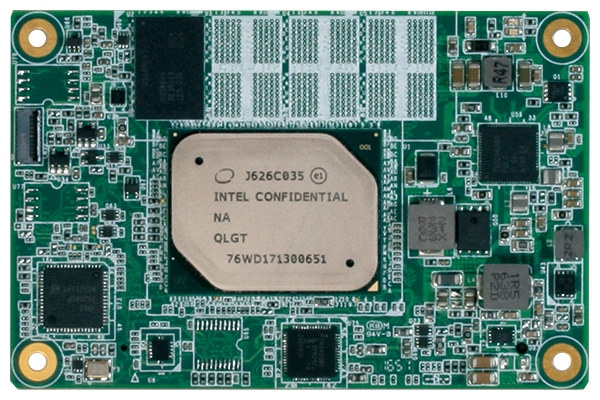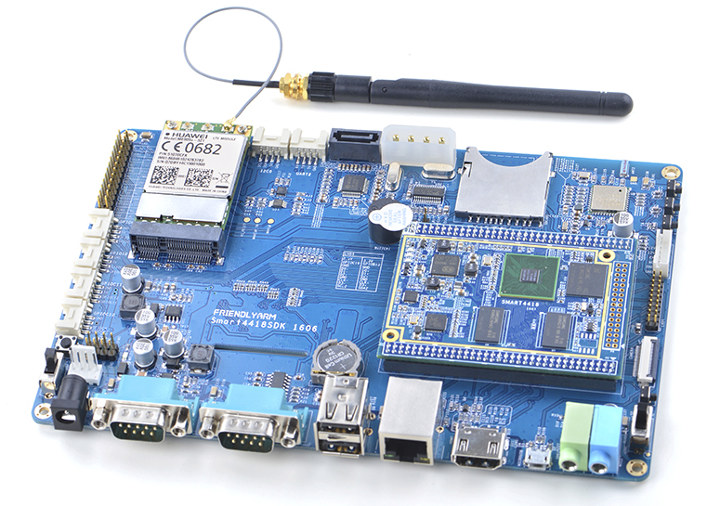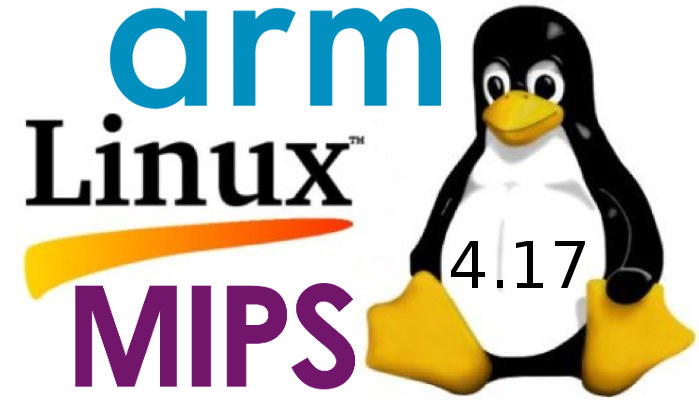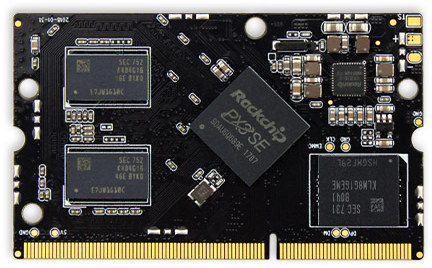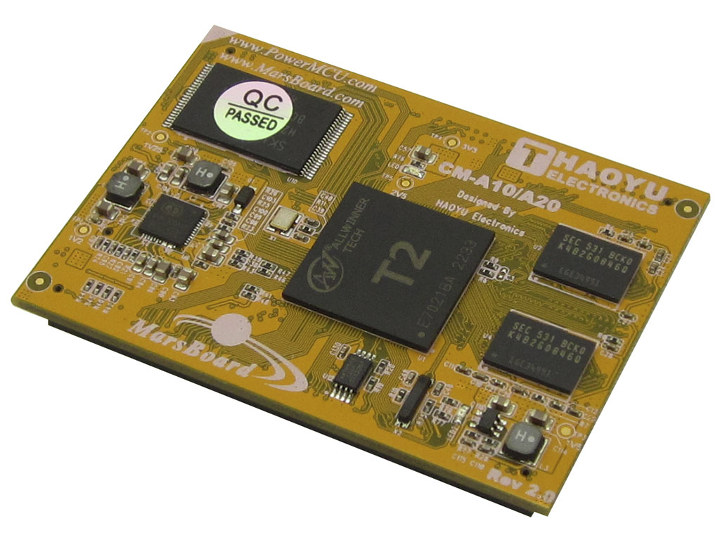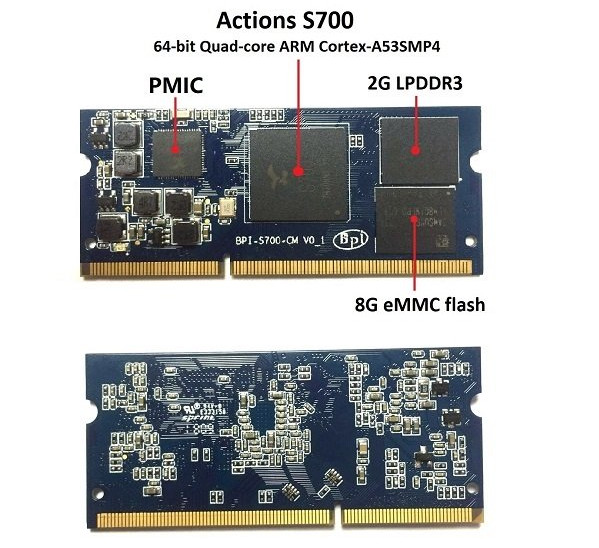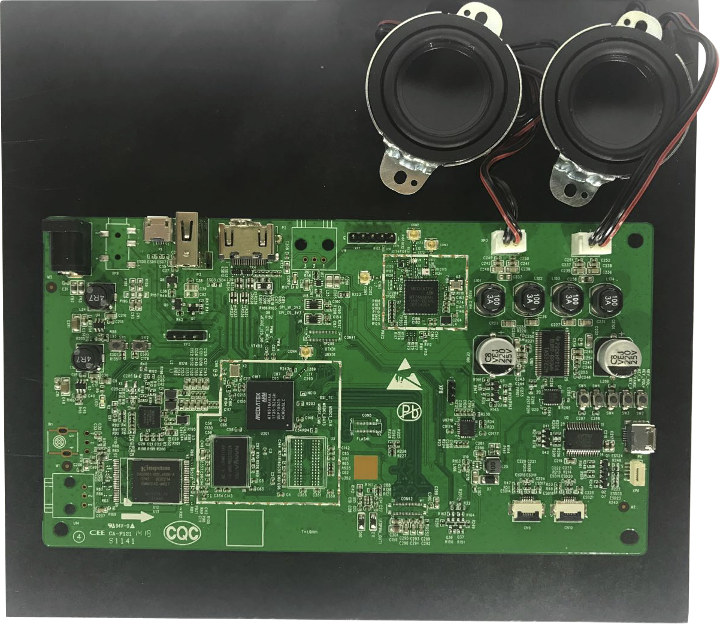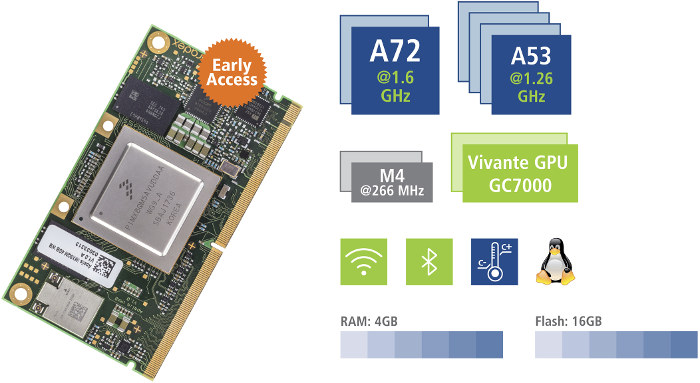AAEON has just launched NanoCOM-APL, a Type 10 COM Express module based on Intel Apollo Lake Atom, Celeron, or Pentium processor with up to 8 LPDDR4 memory, and on-board support for dual MIPI CSI interfaces. The module is designed for machine vision and factory automation, and also features Gigabit Ethernet, optional on-board eMMC flash, PCIe x4, ten USB interfaces, and more. NanoCOM-APL Apollo Lake COM Express Module There are currently three variants of NanoCOM-APL module with the following specifications specifications: SoC NANOCOM-APL-A10-0001 – Intel Pentium N4200 quad core Apollo Lake processor @ 1.10 / 2.50 GHz with Intel HD Graphics 505; 6W TDP NANOCOM-APL-A10-0002 – Intel Celeron N3350 dual core Apollo Lake processor @ 1.10 / 2.40 GHz with Intel HD Graphics 500; 6W TDP NANOCOM-APL-A10-0003 – Intel Atom x7-E3950 quad core Apollo Lake-I processor @ 1.60 / 2.00 GHz with Intel HD Graphics 505; 12W TDP System Memory – […]
FriendlyElec Launches Smart6818 Samsung S5P6818 CPU Module
Yesterday, we covered Core4418 low profile board based on Samsung S5P4418 quad core Cortex A9 processor, but that’s not the only product launched by FriendlyElec this week, as the company also introduced Smart6818, a Samsung S5P6818 CPU module following Smart4418 module design, and equipped with 1GB DDR3, and 8 to 32 GB eMMC flash. Smart6818 specifications: SoC – Samsung S5P6818 octa core Cortex A53 processor @ up to 1.4GHz, Arm Mali-400MP GPU System Memory – 1GB DDR3 up to 800 MHz Storage – 8GB eMMC flash (16GB and 32GB optional) Connectivity – Realtek RTL8211E Gigabit Ethernet transceiver Audio – ES8316 Audio codec Board to Board Headers 2x 70-pin 2.0mm pitch headers with RGB LCD, LVDS, HDMI Tx, I2C, PWM, USB host, UART, SPI, GPIOs, SDIO, Gigabit Ethernet, Audio input/output, Camera I/F 1x 34-pin 2.0mm pitch unpopulated header with GPIOs, MIPI CSI, ADC, PWM Power Supply – 5V Power Management – […]
Linux 4.17 Release – Main Changes, Arm & MIPS Architectures
Linus Torvalds released Linux 4.17 last Sunday: So this last week was pretty calm, even if the pattern of most of the stuff coming in on a Friday made it feel less so as the weekend approached. And while I would have liked even less changes, I really didn’t get the feeling that another week would help the release in any way, so here we are, with 4.17 released. No, I didn’t call it 5.0, even though all the git object count numerology was in place for that. It will happen in the not _too_distant future, and I’m told all the release scripts on kernel.org are ready for it, but I didn’t feel there was any real reason for it. I suspect that around 4.20 – which is I run out of fingers and toes to keep track of minor releases, and thus start getting mightily confused – I’ll switch […]
Firefly Core-PX3-SEJ SoM Features Rockchip PX3-SE Industrial-Grade Processor
Allwinner is not the only Chinese fabless silicon vendor to offer industrial grade processors, as Rockchip PX3 SE quad core Cortex A7 processor can also operate in the industrial temperature range (-20°C to 80°C). I had covered Rockchip PX3 previously, but it’s the first time I read about Rockchip PX3-SE processor, and Firefly is the first company to integrate the processor into a product, namely Core-PX3-SEJ system-on-module. Core-PX3-SEJ module specifications: SoC – Rockchip PX3-SE quad core Cortex A7 processor @ 1.3 GHz with Arm Mali-400MP2 GPU – See datasheet for details System Memory – 512MB, 1GB or 2GB dual-channel DDR3 Storage – 4GB, 8GB, 16GB, or 32GB eMMC flash Edge Connector – 204-pin DDR3 SO-DIMM connector with Storage – Micro SD card interface Connectivity SDIO interface for WiFi & Bluetooth module Gigabit Ethernet Display – HDMI up to 1080p, CVBS, MIPI DSI or LVDS for LCD display Audio – Via […]
Allwinner T2 is a Rebranded Allwinner A20 Processor Operating in Industrial Temperature Range
Last month, Allwinner unveiled A40 and A60 industrial and military grade processors leveraging IP blocks from the old-but-popular Allwinner A20 dual core processor. This is good news for software support, as A40 and A60 should hopefully become supported in U-boot and the Linux kernel without too many efforts, as well as for companies or makers requiring wider temperature ranges in their products. However, those new processors were not pin-to-pin compatible with Allwinner A20, so a PCB redesign would be required. That’s where Allwinner T2 comes into play, as reported by Olimex, it is a rebranded Allwinner A20 dual core Cortex A7 processor with an industrial temperature range (-40 to +85 °C) that makes it suitable for automotive infotainment. I actually covered Allwinner T2 back in 2015, but at the time Allwinner did not mention anything about temperature range, and SATA support – found in A20 – was not shows in […]
Banana Pi BPI-S64 Core is a “Compute Module” based on Actions Semi S700 Processor
SinoVoIP has launched many development boards & SBCs under the Banana Pi brands, but so far they had not designed any system-on-modules (SoM). Banana Pi BPI-S64 Core is their first SoM, which they refer to as “Compute Module” for the compulsory Raspberry Pi reference, and it’s not based on Allwinner or Realtek processors used in many of their recent boards, but instead an Actions Semi S700 quad core Cortex A53 processor. Banana Pi BPI-S64 Core specifications: SoC – Actions Semi S700 quad core Arm Cortex-A53 processor with Arm Mali-450MP4 GPU with OpenGL ES2.0/1.1, OpenVG 1.1, EGL 1.5 support System Memory – 2GB LPDDR3 Storage – 8GB eMMC flash Edge Connector – 204-pin SO-DIMM connector Power Supply – PMIC on-board Dimensions – 67.5 x 30 mm The company also provides Banana pi BPI-S64 core kit for getting started with the module. Development kit preliminary specifications: SODIMM slot for Banana BPI-S64 Core […]
A Closer Look at Mediatek MT8516 Cortex A35 SoM / Devkit for Android Things
Earlier this month, Google released Android Things 1.0, the first stable release for the IoT operating system, and announced several certified SoMs (systems-on-module) based on NXP i.MX 8M, Qualcomm SDA212 & SDA624, and MediaTek MT8516 SoCs. However at the time, beside some information about the processor itself, there was not many details about MT8516 system-on-module. Since then, MediaTek wrote a blog post about their Cortex A35 solution for Android Things & Google Assistant, so let’s have a look. First the MT8516 SoM is not exactly what I had expected, but instead a complete single board computer, and this is why they call it virtual SoM (vSOM). Google defines the latter as reference design provided by the chip vendors and certified by Google. Mediatek MT8516 quad core Cortex A35 vSoM / development board specifications: SoC – MediaTek MT8516 quad core Cortex A35 processor without GPU System Memory – 4Gbit (512MB) DDR3L […]
Toradex Launches Apalis iMX8 Computer-on-Module based on NXP i.MX 8QuadMax SoC
Toradex Apalis iMX8 is another system-on-module powered by NXP i.MX 8QuadMax hexa core Arm Cortex A72 + 53 processor, which comes with 4GB LPDDR4 RAM, up to 16GB flash, and an on-board dual-band 802.11ac 2×2 MU-MIMO Wi-Fi and Bluetooth 5 ready module. The company has just opened early access for selected customers, so it has become possible to start developing products with the MXM3 computer-on-module. Apalix i.MX8 module specifications: SoC – NXP i.MX 8QuadMax hexa core processor with 2x Arm Cortex-A72 cores @ 1.6 GHz, 4x Arm Cortex-A53 cores @ 1.26 GHz, 2x Cortex-M4 real-time core @ 266 MHz, and dual Vivante GC7000XSVX GPU System Memory – 4GB LPDDR4 (64 Bit) Storage – Up to 16GB eMMC flash On-module Connectivity Gigabit Ethernet via Microchip KSZ9031 transceiver with low power features Dual-band 802.11ac 2×2 MU-MIMO Wi-Fi and Bluetooth 5 via Azurewave AW-CM276NF M.2 1216 LGA module Audio – NXP SGTL5000 low […]


